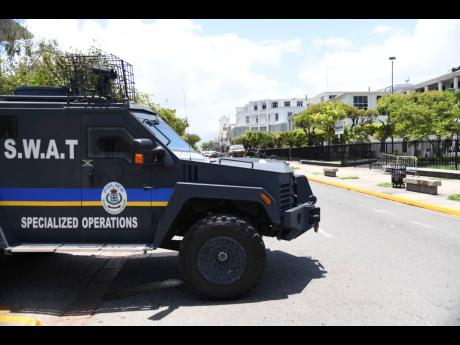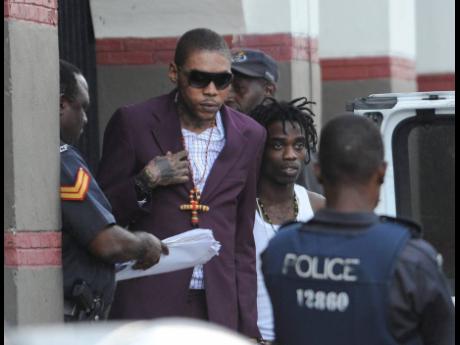HEARSAY CHALLENGE
Prosecution objects to witness opinion as Kartel retrial hearing begins; son’s illness argument among points struck out
Defence lawyers representing Adidja ‘Vybz Kartel’ Palmer and his co-accused are contending that the unavailability of technological material that was used in their original murder trial will affect their clients’ defence if a retrial is granted.
While the attorneys have submitted a report from an expert witness in support of the claim, the prosecution is objecting to the document, challenging it as hearsay.
The prosecution has further contended that the expert witness, IT consultant Shawn Wenzel, has presented an opinion outside of his expertise.
Court of Appeal judges Justice Marva McDonald-Bishop, David Fraser and Paulette Williams are presiding over a hearing to determine whether the men – Palmer, Shawn Campbell, Kahira Jones and Andre St John – are to be retried or acquitted in the 2011 murder of Clive ‘Lizard’ Williams. They have reserved a ruling until the matter is fully hashed out in the substantive hearing, which is to start today.
The objection was raised by Assistant Director of Public Prosecutions Janek Forbes, who cited three issues with the affidavit submitted supporting the report.
Forbes argued that the report does not conform with what the law stipulates and also addresses the expert’s review of the report, which is not included in the affidavit, and on that basis, said it would be considered hearsay.
“He purports to give an opinion on that phantom report, and secondly, he purports to give his opinion on the effect of pretrial publicity,” Forbes said, noting that the expert has attempted to provide his opinion on a matter outside his knowledge.
Intervening, Justice McDonald-Bishop pointed out that the scope of the court’s consideration does not include assessing evidentiary material.
“Isn’t this a case that the court could well take judicial notice of, that it has gained widespread publicity? Is that contested? Because the question is whether pretrial publicity is a ground for barring a retrial. That is what we are here for,” she said.
Attorney-at-law John Clarke, however, submitted that the legal precedent has established that material which could help in determining the issue should be considered, hence the importance of the report.
Consequently, he noted that the expert has ascertained whether the defendants would be prejudiced by the delay in relation to any expert analysis of the technological evidence.
“What we are saying [is] if there is a retrial, it will be impossible for the expert to analyse some of the technological evidence for the defence to have adequate facilities to mount the defence’s case,” Clarke stated.
He pointed to examples, including JS1 material, which was unavailable to the defence during the trial, and data from both telecommunications service providers, which had a one-year lifespan and would now no longer be available to the defence.
Responding, McDonald-Bishop indicated that Clarke was rehashing matters that were brought up by the case and were not addressed by the Privy Council, while emphasising that the appellate court cannot determine admissibility of evidence or weight.
But Clarke insisted that one of the factors that will militate against a fair retrial is the unavailability of technological materials.
“What we are saying [is] in assessing this material, we firmly believe that this report and material refer would assist the court in answering many factors and answering the ultimate question of whether the appellant’s right to a fair trial and to adequate facilities to prepare their case will be affected by the delay,” he said.
Noting that the purpose of the report and legal standing on the retrial must be clear, McDonald-Bishop reserved a decision on the issue until it has been fully deliberated in the substantive hearing with supporting authorities.
Forbes’ objection followed an earlier preliminary objection raised by acting Director of Public Prosecutions Claudette Thompson, who asked the court to strike out several portions of the defence’s affidavits, noting that some of the pleadings were argumentative and speculative, irrelevant, hearsay, or a legal argument.
The prosecution’s objection, which took up the entire day, also saw the Crown abandoning challenges to several areas of the respective affidavits.
Among the portions that were struck out was an argument from Palmer’s son that he would not be able to stand another trial because of his illness. The court ruled that the son was unable to make such a determination without support from a medical expert.
The court, on the other hand, ruled against rejecting arguments from Campbell’s sister that the men would not be able to get a fair trial because of widescale publicity on the matter by bloggers, who have been spreading false theories and influencing negative views on the case.
In the meantime, the appellate court has indicated that it has requested an update on all the cases which have been sent back to the Supreme Court for retrial in the last six years. The judge noted that the update will be among factors considered in deciding on retrial.
The hearing is expected to last for five days.
The four men were convicted in March 2014 for Williams’ murder and sentenced to life in prison a month later.
The Court of Appeal upheld their convictions.
However, on March 14, 2024, the United Kingdom-based Privy Council, Jamaica’s final appellate court, overturned the convictions on the grounds of juror misconduct.
However, the Privy Council did not free the men and has, instead, left the decision with the appeal court.
Kartel and Campbell are being represented by Isat Buchanan and Alessandra Labeach, while Clarke and Iqbal Cheverria are representing Jones and St John.


